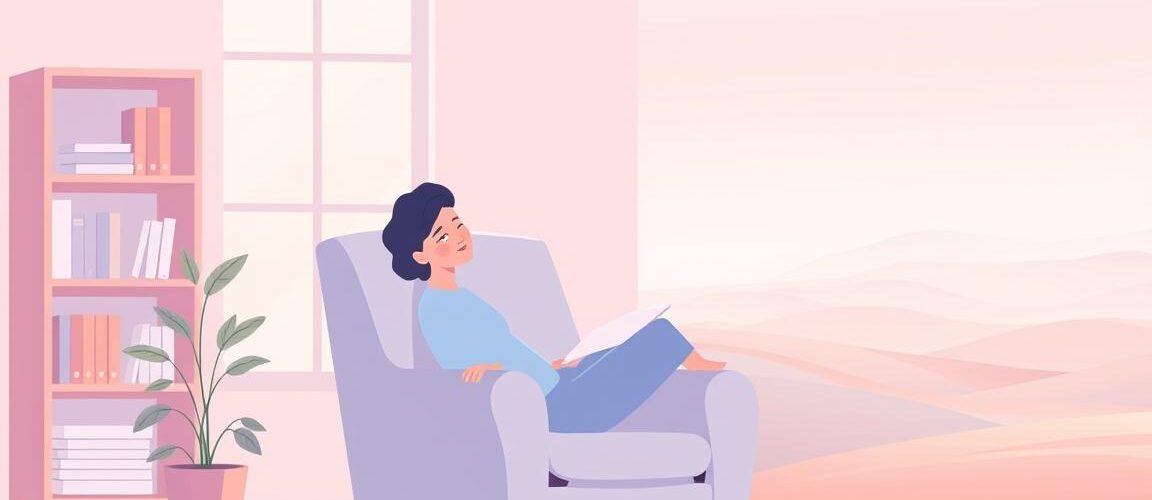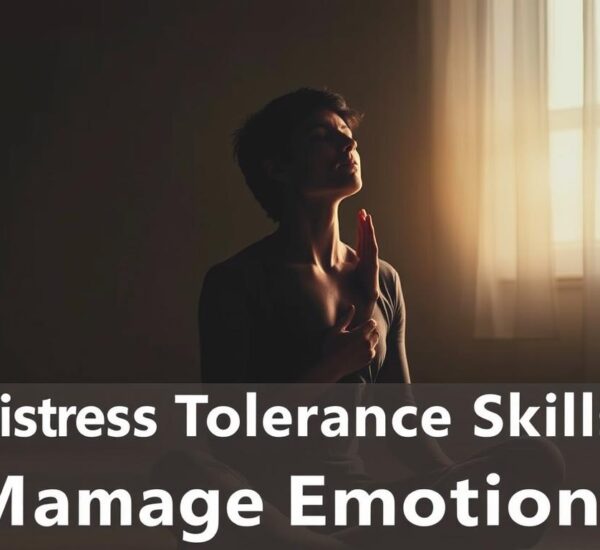We often struggle with the demands of modern life. It’s common to feel overwhelmed by stress and anxiety. Luckily, there’s a powerful tool to help: counseling. It lets us understand ourselves better and learn to handle life’s challenges.
Through therapy, we can get better at talking to others. We learn how to manage stress and set goals for ourselves. This can make our lives more balanced and fulfilling. Let’s see how counseling can help keep our mental health in check.
Key Takeaways
- Improve communication skills through counseling.
- Manage stress and anxiety effectively.
- Set and achieve personal goals.
- Develop a deeper understanding of yourself.
- Enhance overall mental well-being.
Understanding Therapy: What It Is and How It Works
Therapy helps people deal with life’s tough parts better. It’s also known as psychotherapy. It’s a way to understand and control thoughts, feelings, and actions.
It’s a holistic healing method for many mental health issues. This includes anxiety, depression, trauma, and relationship problems. Therapy offers a safe space to face challenges and find ways to get past them.
Definition of Therapy
Therapy is a team effort between the therapist and the person getting help. It aims to boost mental health and happiness. It uses different methods to help people understand themselves, manage feelings, and better their relationships.
Different Types of Therapy
There are many types of therapy, each with its own way and benefits. Here are a few:
- Cognitive-behavioral therapy (CBT) helps change negative thinking.
- Dialectical behavior therapy (DBT) uses CBT and mindfulness to handle emotions.
- Psychodynamic therapy looks into why we think and act the way we do.
Goals of Therapy
The main goal of therapy is to help people reach their best and live better lives. Some key aims are:
- To lessen symptoms of mental health issues.
- To better manage emotions and stay strong.
- To improve how we connect with others.
Knowing about different therapies and their goals helps people choose the right care. It’s a big step towards a happier life.
The Importance of Mental Health
Understanding mental health is key in today’s world. It covers our emotional, psychological, and social well-being. It shapes how we think, feel, and act.
Good mental health helps us deal with stress, build strong relationships, and make smart choices. It’s essential for our overall health and helps us face life’s challenges.
Statistics on Mental Health in the U.S.
In the U.S., mental health issues have grown. Nearly one in five adults in the U.S. lives with a mental illness. This means about 47.6 million people are affected, showing how common mental health problems are.
- Mental illness affects people of all ages, but young adults are more at risk.
- The high number of mental health issues shows we need more awareness and support.
- Knowing these stats helps us find better ways to tackle mental health problems.
Common Mental Health Issues
In the U.S., many mental health conditions are common. These include anxiety disorders, depression, bipolar disorder, and PTSD. These issues can really affect someone’s life, making it hard to work, keep relationships, and do everyday things.
Knowing the signs of these conditions is the first step to getting help. Common signs include:
- Feeling sad or anxious all the time.
- Changes in appetite or sleep.
- Having trouble concentrating or making choices.
Recognizing When to Seek Help
It’s important to know when you need professional help for mental health. If you’re feeling overwhelmed, sad, or have other mental health issues, it’s time to seek help.
Getting help early can really help manage mental health problems. There are therapists, support groups, and hotlines that offer emotional support and guidance.
How Therapy Benefits Individuals
Therapy can lead to big changes in our lives. It gives us a safe space to look at our thoughts, feelings, and actions. This helps us understand ourselves and others better.
Emotional Relief
One key benefit of therapy is emotional relief. It helps us deal with stress, anxiety, and other tough feelings. This leads to better mental health and happiness. Mindfulness and cognitive-behavioral therapy teach us to cope in healthier ways.
A study showed therapy cuts down anxiety. Here’s what it found:
| Therapy Type | Pre-Therapy Anxiety Score | Post-Therapy Anxiety Score |
|---|---|---|
| Cognitive-Behavioral Therapy | 80 | 40 |
| Mindfulness Therapy | 75 | 35 |
Improved Relationship Skills
Therapy also boosts improved relationship skills. By knowing our emotions and actions, we talk better with others. This helps us build strong bonds and handle disagreements well.
Personal Growth
Therapy also supports personal growth. It helps us find our strengths, values, and goals. This self-knowledge lets us make better choices and aim for personal happiness.
In short, therapy brings many benefits. It helps with emotional relief, better relationships, and personal growth. By going to therapy, we can see big improvements in our lives and overall well-being.
Therapy as a Support System
Therapy is a big help for those with mental health problems. It offers a complete way to heal. We’ll see how therapy helps people feel less lonely and build strong support networks.
Therapy is great at fighting loneliness. Many people feel isolated, which makes mental health problems worse.
Overcoming Loneliness
Therapy gives a steady, caring place to talk about feelings. Sharing experiences can fight loneliness well.
- Having a good therapist makes people feel understood.
- Therapy pushes people to join social activities and make new friends.
- It helps tackle deep issues, reducing feelings of being alone.
Building a Support Network
Therapy also helps build a support network. This network includes the therapist, support groups, and caring friends and family.
Key elements of building a support network through therapy include:
- Finding and connecting with supportive people.
- Learning to talk well in relationships.
- Joining group therapy or support groups to meet more people.
Therapy offers emotional support and a sense of belonging. As therapy goes on, people’s mental health usually gets better.

In short, therapy is more than just treating mental health. It’s a full support system for holistic healing and emotional support, leading to better mental wellness.
Tailored Approaches: Finding the Right Therapist
Finding the right therapist is key to your mental health journey. It can greatly affect how well therapy works for you. Therapy is a personal process that needs a good match between you and your therapist. We’ll look at the different types of therapists and what to ask when searching for the right one for you.
Types of Therapists
There are many types of therapists, each with their own way of working and area of focus. The most common types include:
- Cognitive Behavioral Therapists, who focus on changing negative thought patterns.
- Psychodynamic Therapists, who explore the unconscious motivations behind your actions.
- Humanistic Therapists, who emphasize personal growth and self-actualization.
- Family Therapists, who work with families to improve communication and resolve conflicts.
Knowing about these different types can help you find the right one. For example, if you’re having problems in your relationship, you might want to try couples therapy or family therapy.
| Type of Therapist | Focus | Approach |
|---|---|---|
| Cognitive Behavioral Therapist | Changing negative thought patterns | Directive, problem-focused |
| Psychodynamic Therapist | Exploring unconscious motivations | Non-directive, exploratory |
| Humanistic Therapist | Personal growth and self-actualization | Non-directive, empathetic |
| Family Therapist | Improving family dynamics | Systemic, involving family members |
Questions to Ask a Potencial Therapist
When you find therapists you’re interested in, it’s important to ask the right questions. This will help you see if they’re the right fit for you. Some key questions include:
- What experience do you have in dealing with issues like mine?
- What therapeutic approach do you use, and how might it help me?
- How will we measure progress in therapy?
- What is your policy on confidentiality and communication?
Asking these questions can give you insight into the therapist’s qualifications and approach. This helps you make a well-informed choice.
Choosing the right therapist is a personal decision that needs careful thought. Remember, the right therapist can provide a safe and supportive place for your mental health growth.
By understanding the different types of therapists and asking the right questions, you can find a therapist who suits your needs. We encourage you to take this important step towards improving your mental wellbeing.
Debunking Common Myths About Therapy
Many people think therapy is only for serious mental health problems. They believe it’s for those who can’t handle everyday life. But, therapy helps anyone who wants to feel better, no matter the issue.
Therapy, or psychotherapy, is talking to a trained therapist about your life. It’s a way to understand yourself better and manage stress. By clearing up myths, we can make therapy seem more normal and encourage more people to get help.
Myth: Therapy is Just for Severe Issues
Many think therapy is only for serious mental health problems. But, it helps with many things like stress, anxiety, and improving relationships. It’s about growing and getting better, not just fixing problems.
| Benefit | Description |
|---|---|
| Emotional Relief | Therapy offers a safe place to share feelings and work through tough times. |
| Improved Relationship Skills | Understanding yourself and others better leads to better relationships. |
| Personal Growth | Therapy helps you grow and reach your goals through self-reflection. |
The Stigma Surrounding Therapy
Even though therapy is becoming more accepted, there’s a stigma. This makes people afraid to seek help, fearing judgment. But, asking for therapy shows you’re taking care of your mental health.
We think talking openly about therapy can help remove this stigma. This way, we can support those who are brave enough to seek help.
Understanding therapy’s true benefits can encourage more people to seek help. It’s a powerful tool for healing, providing a safe space to explore your thoughts and feelings.
Integrating Therapy into Daily Life
Therapy isn’t just for the therapist’s office. It’s a journey that supports our mental health every day. By adding therapeutic techniques to our daily routine, we strengthen the skills learned in therapy. This leads to better progress and improvement.
Practical Techniques for Home Practice
One great way to make therapy a part of our lives is by practicing at home. Mindfulness and meditation are great for reducing stress and building emotional strength. We can start with simple exercises like deep breathing or guided meditation. These can become a regular part of our day.
Cognitive-behavioral therapy (CBT) exercises are also helpful. They help us spot and change negative thoughts. Keeping a thought journal helps us understand our thoughts and feelings better. This way, we can tackle them more effectively.
The Power of Journaling and Reflection
Journaling is a therapeutic practice that lets us express ourselves safely. Writing down our thoughts, feelings, and experiences helps us see our behaviors and patterns. This reflective process helps us grow and heal emotionally.
To make journaling work, we should set aside a few minutes each day. It’s not about grammar or spelling; it’s about being honest. We can use prompts or just let our thoughts flow. Over time, journaling becomes a tool for tracking our progress and celebrating our wins.
By adding these practices to our daily lives, we can improve our self-care and emotional support. This enhances our overall mental wellness.
The Role of Family in Therapy
Therapy isn’t just for one person; family plays a big role too. When family gets involved, therapy works better. It creates a supportive space for healing and growth. Let’s see how family therapy works and how you can help a loved one.
Family Therapy Explained
Family therapy, or counseling, includes the whole family. It shows how family dynamics affect mental health. By working on these dynamics, therapy aims to improve communication and solve conflicts.
It’s great for families facing big challenges, like divorce, loss, or addiction.
How to Support a Loved One in Therapy
Supporting someone in therapy takes empathy, understanding, and patience. Here are some tips:
- Listen without judging, letting them share their feelings.
- Encourage them to keep going to therapy, showing them its benefits.
- Be patient with their progress, knowing healing takes time.
- Learn about their mental health issues to better understand them.

Adding family to therapy helps with deeper healing. It builds a support network that helps everyone in the family. This leads to a healthier family dynamic.
Group Therapy: A Different Dynamic
Group therapy brings people together who share similar experiences. It’s a supportive place where everyone can share their stories. They also get support and learn from others facing similar challenges.
Group therapy is great for emotional support and feeling part of a community. Being in a group makes people feel less alone. This connection is key for holistic healing, improving both mental health and social well-being.
Advantages of Participating in Group Therapy
Group therapy offers many benefits for mental wellness. Some key advantages include:
- Shared experiences and understanding among group members
- Opportunities to learn new coping strategies and techniques
- A supportive community that fosters a sense of belonging
- Improved social skills through interaction with others
For more insights on innovative approaches to mental health and wellness, visit Prosper Glow’s article. It talks about managing rare chronic diseases and the importance of a supportive community.
What to Expect in Group Therapy Sessions
In group therapy, you’ll find a structured setting with a therapist leading the way. Sessions are designed to be supportive and engaging. They allow participants to share their experiences and learn from others.
Common elements in group therapy sessions include:
- Introduction and icebreaker activities to help participants get to know each other
- Discussion topics that are relevant to the group’s focus, such as coping strategies or stress management
- Activities or exercises designed to promote learning and personal growth
By knowing what to expect and being open, individuals can get the most out of group therapy. This helps them on their journey towards mental wellness.
When Therapy Might Be Necessary
Knowing when you need therapy is key to better mental health. Therapy is tailored to fit your needs, helping with many mental health issues.
Life’s ups and downs can affect our mental health. Significant life changes or persistent feelings of overwhelm might mean it’s time for therapy.
Signs You Should Consider Therapy
Here are some signs you might need therapy:
- Feeling overwhelmed or stuck in a situation
- Experiencing significant anxiety or depression
- Having trouble managing emotions or behaviors
- Going through a big life change, like a divorce or loss
- Noticing problems in relationships with family or friends
Seeing these signs doesn’t mean you definitely need therapy. But they suggest it might be helpful to explore.
Life Changes That Prompt Therapy
Some life events might make you think about therapy. These include:
- Major life changes, like moving or changing jobs
- Relationship issues, like divorce or conflicts with loved ones
- Traumatic events, like experiencing or witnessing something scary
- Health problems, either your own or a family member’s
These big events can be tough to handle alone. Therapy can offer the support you need.
Understanding when therapy might be needed helps us take care of our mental health. It’s about knowing when to ask for help and taking steps towards healing and growth.
The Future of Therapy
The world of therapy is changing fast, thanks to new tech and society’s needs. Now, we see more ways to get help for mental health that are easy to reach and open to everyone.
Telehealth: The Rise of Online Therapy
Telehealth, or online therapy, is a big deal now. It lets people get therapy at home, without worrying about where they are or how they get there. Telehealth has opened up new possibilities for those who may have previously been unable to access traditional in-person therapy.
Benefits of Telehealth
Telehealth has many good points, like:
- It’s easier for people in far-off or hard-to-reach places to get help.
- It lets you pick a time that works for you, not just when a therapist is free.
- It saves money because you don’t have to travel.
- You can find more therapists to choose from.
Emerging Trends in Psychological Treatment
New things are happening in therapy too. For example, holistic healing like mindfulness and meditation are being added to old ways of therapy.
| Trend | Description | Benefits |
|---|---|---|
| Holistic Healing | Integration of mindfulness and meditation into therapy | Reduced stress, increased well-being |
| Virtual Reality Therapy | Use of VR technology to simulate therapeutic environments | Increased immersion, improved outcomes |
| Group Therapy Platforms | Online platforms for group therapy sessions | Increased social support, cost-effective |
As we learn more about mental health and psychotherapy, we’ll see even more new ways to help people.
Conclusion: Taking the First Step Toward Healing
Life can be complex, and taking care of our mental health is key. Asking for help shows we are strong. Therapy offers a safe place for emotional support and self-care.
Starting our healing journey helps us understand ourselves and others better. This leads to more meaningful relationships and a sense of purpose. We can find a therapist who fits our needs.
Finding the Right Support
To begin, check online directories like the Psychology Today website. It lists many therapists in your area. You can also get recommendations from doctors, friends, or family.
Embracing Mental Wellness
Embracing mental wellness and seeking support helps us live a balanced life. Let’s start our healing journey and focus on self-care.



